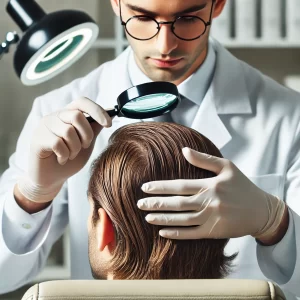Autoimmune diseases and inflammatory conditions are more common than you might think, and they can affect any organ in the body, including the skin and hair. One of the most visible effects of these conditions is changes in hair quality and quantity, sometimes leading to hair loss or alopecia.
This blog post will explore the relationship between autoimmune diseases, allergies, inflammation, and hair loss. We’ll also discuss ways to treat and prevent this type of hair loss effectively.
What Are the Common Causes of Hair Loss?
Alopecia, or hair loss, is a common issue faced by individuals of all ages worldwide. Hair loss can result from multiple pathological conditions, including autoimmune diseases, stress, thyroid disease, anemia, protein deficiency, and low vitamin levels. Some medical treatments, like chemotherapy, can also lead to significant hair loss.
What is Alopecia Areata (AA)?
Alopecia Areata (AA) is a specific type of alopecia with an autoimmune background. In this condition, hair loss is not limited to the scalp but can also affect the eyebrows, facial hair, or other parts of the body. The pattern of hair loss varies, ranging from patchy to widespread.
While autoimmunity is a known cause of alopecia, other factors such as genetics and environmental elements play crucial roles in how quickly the condition progresses and whether its effects will become more severe. Alopecia areata is also associated with diseases of the endocrine glands, stress, emotional shock, vitiligo, atopic dermatitis, and reflex irritation from focal lesions like dental abscesses.

Is There a Connection Between Allergies and Hair Loss?
Recent studies suggest a possible association between allergic diseases and alopecia areata. Observations indicate that specific allergies—such as atopic rhinitis, asthma, or dermatitis—may correspond with the severity and onset of hair loss in alopecia areata. This connection could be due to the shared genetic background between these diseases, all of which involve an abnormal immune response.
Literature shows that alopecia areata is associated with atopy in 10–22% of patients, which is twice as prevalent compared to the general population. Similarly, patients with alopecia areata have been reported to have a higher risk of allergic diseases, including atopic eczema, hay fever, asthma, and rhinitis.
A study conducted on the Chinese population concluded that allergies to dust mites could contribute to the early onset and severity of alopecia areata by affecting the immune system. Additionally, an analytical study from Texas in 2009 revealed that a history of atopy and autoimmune disease increases the risk of alopecia areata. This was consistent for both severe forms of AA (alopecia totalis and alopecia universalis) and the localized subtype (AA persistent).
Will My Hair Grow Back After Allergies?
Yes, your hair can grow back after an allergic reaction, but the process may take some time. The duration depends on the severity of the allergic reaction and how long you were exposed to the allergen.
If you experience hair loss due to allergies, it is crucial to identify and avoid the allergen causing the reaction. Treatments such as topical medications, oral medications, and light therapies can speed up hair regrowth. Ensuring you get enough nutrients in your diet to support healthy hair growth is also essential. With proper treatment and avoidance of allergens, your hair should eventually grow back.

What Underlying Conditions Can Make Your Hair Fall Out?
Various underlying conditions can cause hair loss. These range from medical issues such as hormonal imbalances, autoimmune diseases, thyroid problems, and nutritional deficiencies to lifestyle factors like stress, over-styling, and the use of harsh hair products.
- Hormonal Imbalances: Often cause hair loss due to the body producing too much or too little of certain hormones.
- Autoimmune Diseases: Conditions such as lupus or alopecia areata can lead to hair loss.
- Thyroid Problems: Disrupt normal hormone production and lead to thinning hair.
- Nutritional Deficiencies: Inadequate intake of protein, iron, or other essential nutrients can contribute to hair loss.
- Stress: Increases cortisol levels in the body, leading to hair loss.
- Over-Styling: Using harsh styling products or excessive heat can damage the scalp and hair follicles, leading to breakage and thinning hair.
Can Seasonal Allergies Cause Alopecia?
Seasonal allergies can cause inflammation of the scalp, leading to hair loss. Additionally, they can cause itching and irritation, which may lead to excessive scratching and further damage to hair follicles, potentially causing alopecia.
Seasonal allergies can also weaken the immune system, making it more susceptible to infections and inflammation of the scalp and hair follicles. If left untreated, this could result in permanent hair loss. Therefore, it is crucial for those suffering from seasonal allergies to manage their symptoms to prevent them from worsening and potentially leading to alopecia.
Is Hair Loss Due to Allergy Reversible?
Hair loss due to allergies is common and is usually reversible once the allergen is identified and removed from the individual’s environment. It’s essential to seek medical advice if you’re experiencing hair loss due to an allergy, as identifying the allergen can be challenging.
A doctor may recommend allergy testing, such as a skin prick test, to determine what is causing the allergic reaction. Once the allergen has been identified and avoided, hair loss should stop, and new hair growth can begin. In some cases, medication may be prescribed to reduce allergic reaction symptoms. With proper diagnosis and treatment, most people with hair loss due to allergies can expect their hair to grow back within a few months.
What Am I Lacking If My Hair Keeps Falling Out?
If your hair keeps falling out, you may lack essential nutrients in your diet, such as proteins, vitamins, and minerals necessary for healthy hair growth. It could also indicate an underlying medical condition like alopecia or thyroid disease. Stress is another significant factor, so managing stress levels is important.
Certain medical treatments or medications may also have side effects that include hair loss. It is essential to talk to a trichologist about any potential side effects of treatments or medicines before taking them.
To determine if you have any deficiencies, you might need to undergo bloodwork to check your nutrient levels. Taking these steps can help identify the cause of your hair loss and ensure that you’re taking the necessary measures to improve your hair’s health.
Can Food Allergies Cause Hair Loss?
Yes, food allergies can cause hair loss. The body’s reaction to an allergen can produce antibodies that damage hair follicles, affecting their ability to create new strands. Additionally, food allergies can trigger inflammation in the body, reducing the nutrients and oxygen needed for healthy hair growth.
Symptoms of food allergies related to hair loss include scaly skin on the scalp, an itchy scalp, and dandruff-like flakes. If you suspect that a food allergy is causing your hair loss, it’s wise to consult a trichologist for proper diagnosis and treatment. Your doctor may recommend an elimination diet or tests to determine which allergens are causing your symptoms.
What About Scalp Allergies Caused by Product Ingredient Sensitivity?
Scalp allergies caused by sensitivity to product ingredients can be uncomfortable and cause a range of symptoms, including hair loss. Allergic dermatitis, an inflammation or rash on the scalp, can result from exposure to allergens in hair products, leading to itchiness, redness, and even hair loss.
To treat scalp allergies, it’s crucial to identify and avoid the source of the allergen. Switching to natural shampoos and conditioners with fewer allergens can also help reduce symptoms like irritation or dryness. For instance, choosing products free from sodium lauryl sulfate (SLS) can prevent further damage to the hair’s protein structure.
Frequently Asked Questions (FAQs)
What causes alopecia to flare up?
Alopecia areata can flare up due to various factors, including stress, hormonal changes, and environmental triggers. Managing stress and maintaining a balanced lifestyle can help minimize occurrences. Some studies suggest that allergens or infections might trigger or worsen flare-ups in susceptible individuals.
What is the trigger of alopecia areata?
Alopecia areata is primarily triggered by an autoimmune response, where the body’s immune system mistakenly attacks hair follicles. Genetic factors, stress, and environmental influences, such as allergens or infections, can also act as triggers, leading to the onset or worsening of hair loss.
Can a virus trigger alopecia?
Yes, certain viral infections have been associated with triggering alopecia areata. Viruses can stimulate an immune response that may lead to an autoimmune attack on hair follicles in genetically predisposed individuals.
What causes alopecia to flare up?
Alopecia areata can flare up due to various factors, including stress, hormonal changes, and environmental triggers. Managing stress and maintaining a balanced lifestyle can help minimize occurrences. Some studies suggest that allergens or infections might trigger or worsen flare-ups in susceptible individuals.
Why do I suddenly have alopecia?
Sudden alopecia can occur due to several reasons, including stress, hormonal changes, autoimmune reactions, or underlying health conditions. It’s crucial to consult a healthcare professional to determine the specific cause and receive appropriate treatment.
What is the trigger of alopecia areata?
Alopecia areata is primarily triggered by an autoimmune response, where the body’s immune system mistakenly attacks hair follicles. Genetic factors, stress, and environmental influences, such as allergens or infections, can also act as triggers, leading to the onset or worsening of hair loss.
Can allergies cause scalp problems?
Yes, allergies can cause scalp problems, including itching, redness, inflammation, and hair loss. Allergic reactions to certain foods, environmental factors, or hair care products can lead to scalp irritation and even conditions like allergic dermatitis, which can contribute to hair loss if left untreated.
Can a virus trigger alopecia?
Yes, certain viral infections have been associated with triggering alopecia areata. Viruses can stimulate an immune response that may lead to an autoimmune attack on hair follicles in genetically predisposed individuals.

Conclusion
If you’re concerned about hair loss, don’t hesitate to contact a trichologist or other medical professional for help. And if you want to explore the possibility that allergies and autoimmune conditions might play a role in your hair loss, take our quiz. With just a few questions, we can provide insights that might help you identify the root cause of your problem and find a solution.https://www.advancedtrichology.com/

